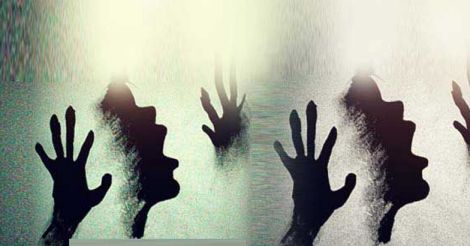There could be many who raise an eyebrow on seeing the word dalit in the headlines about the brutal ragging of a Malayali nursing student at her hostel in Gulburga, Karnataka. A student is a student and torture is torture; so how does her caste matter, they may ask. But such voices belong to those who choose to conveniently sweep under the carpet the continuing caste prejudices in our society -- for they are either unable to, or pretend not to, see the hatred and indignation the underprivileged have to suffer daily.
Reports say that the first-semester student (name withheld) of Al Qamar College of Nursing attracted the ire of her seniors because she was ‘dark.’ The girl told police that she was force-fed phenyl as she refused to obey an order by her seniors to dance nude. She is now at the Kozhikode Medical College Hospital, and police have registered cases under various charges including attempt to murder and atrocities against dalits, against five senior girls from the college.
Read also: Dalit girl stable after brutal ragging, police file FIR against 5 senior students
Being hated for one's complexion may sound strange to young people in the 21st century, especially to those who hail from Kerala, a state that was the cradle to the robust anti-caste movements of the 19th century. Ironically, the tormentors in this case are also from Kerala.
What if the issue was not just the girl's skin color but the manifestation of deep-rooted caste prejudices that still exist in Kerala society? My argument is that there are few, if any, who can boast of skin color that gives them the “privilege” to discriminate against a person with a darker complexion in Kerala. More important, traditionally popular characterization has linked lower caste to a darker skin color, which gives strength to the theory that caste was the real issue here.
Sounds like a stretch? Well, caste is still very much a reality of life in Kerala society, more so for those who were unfortunate to be born into a so-called lower caste.
K. Stalin's documentary, 'India: Untouchable' features the varied ways in which caste is practised across the country. After showing evident and brazen exhibition of caste-based hatred in several states, the camera turns to Kerala. The film shows educated Kerala youths who vehemently oppose caste system and claim not to believe in it. But asked whether they would marry a person from another caste, most of them say, "no".
The documentary is a stunning reminder of how this social evil, a reeking remnant of the times of Manusmriti, still remains a strong undercurrent in our society. It's omnipresent but invisible; it is passed on to generations through daily life discourses. And its ugly face may burst out into the open at any opportune moment, as happened in the hostel room in Gulburga.
Lest we tend to play down caste discrimination and violence, it should be noted that such acts can crush lives – and blow out the feeble flame of hope for a family struggling to rescue itself from its sad existence.
The victim in this case has lost her father, and her mother borrowed Rs 3 lakh to sent her to the nursing school. The mother and daughter might have seen higher education as way to climb out of the humiliating poverty and discrimination that have dogged their life.
But people from their own state have, in one fell swoop, destroyed that dream. It was as if the perpetrators thought their “higher” caste status conferred on them them the right to crush, even push to the brink of death, this “black”, “lower-caste” upstart. Who do you blame for that? The girls who committed the crime, their parents, the society that allows such practices to continue, the government?
More important, how and who will help that mother and daughter rebuild their lives, their dreams?
Let us not allow the real issues to be obfuscated by the many vested interest who will pile on this incident. Because, we need to acknowledge that a problem exists, if we really wish to solve it.
(The views expressed are personal)

























